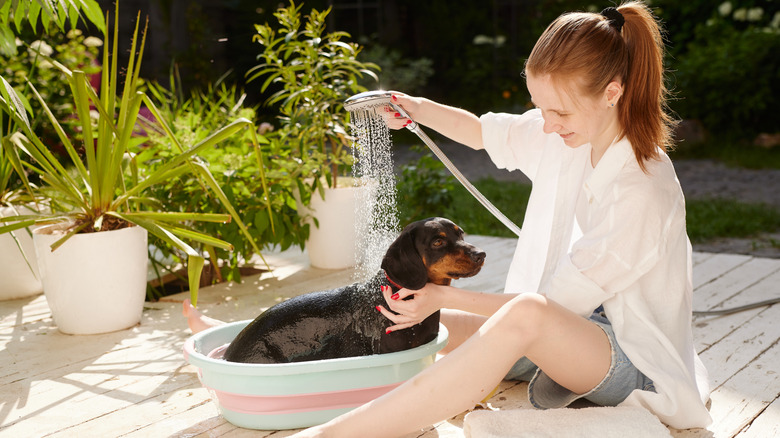The Home Remedy That Alleviates Your Dog's Itchy Skin
Many owners have witnessed their pup lifting their leg to go in for a good scratch. Although not necessarily a cause for concern, you don't want to ignore itching. Plus, no one wants to see their dog in an uncomfortable state. In many cases, the culprits are environmental allergens or flea allergy dermatitis (F.A.D), a condition caused by flea bites. A prescription medication or corticosteroid can help, but there other less expensive treatment methods that don't require chewables or needles may also be effective. According to pet parents, you may be able to provide your dog with some itch relief using an ingredient found in your kitchen: a mixture of apple cider vinegar (ACV) and water.
Apple cider vinegar is widely known for its antimicrobial and anti-inflammatory properties, so it makes sense why this works. A small body of research into its use as a topical skincare agent suggests that its acidic nature creates an unwelcome environment for itch-causing fungi and bacteria to thrive. Indeed, some studies have found it helpful with managing symptoms of fungal infections, like eczema, in humans. On top of that, its strong odor and acidic component also makes it a natural flea repellant, per WebMD. Plus, its relatively inexpensive and easy to access.
Apple cider vinegar can relieve your dog's itchy skin
Although scientific research remains limited, many pet parents who have tried using ACV on their dog to alleviate their itchiness have found helpful. One Reddit user who said they tried the spray method for their flea-ridden dog claimed they saw immediate results. "He was instantly relieved," the post read, adding that their dog stopped scratching ever since they applied it to their fur. Another pet parent added that they had a similar experience using ACV on their dog, and pointed out that it made their coat shinier.
Other owners mixed ACV with their dog's food or water, instead of spraying it. One posted about their experience in a Basset Hound forum, stating that they noticed a reduction in itching within two weeks after mixing it in their water bowl. However, in another pet forum, a dog parent claimed their dog refused to drink the water with ACV in it, so they poured it on their food instead. The results? "It worked brilliantly on the terrier who was prone to itchiness," the post read.
Outcomes may vary from pet to pet, depending on the severity of the condition and the ACV to water ratio. Keep in mind that ACV is not a one-size-fits-all treatment method and may not be suitable for every dog with itchy skin. But if your vet approves the use of this home remedy, you can expect to save money.
How to apply apple cider vinegar on your dog
According to the Animal Health Foundation (AHF), creating a simple concoction that's 50% organic, raw, unfiltered apple cider vinegar and 50% water is all you need to provide your dog with itch relief. After receiving your veterinarian's approval, you can apply apple cider to your dog with a spray bottle. Spritz the mixture over the areas of your dog's fur where you've seen them scratching. Be careful to avoid applying to places like open wounds or scrapes, as this can cause a burning sensation.
You can also apply apple cider vinegar to your pup's fur during bath time. This is a great option if you don't want your dog's coat to have that strong, vinegary stench. Wag! recommends mixing a 1 part ACV to 5-parts water ratio into a bowl or cup. After shampooing your canine, slowly pour the ACV mixture over them, gently massaging it into their fur and skin. Finally, rinse your pup using warm water, ensuring that no soap or ACV residue remains. Store any leftover mixture in the refrigerator for up to two weeks. You can safely repeat this process once or twice a month; you don't want to overdo it, as too much ACV can have the opposite effect.


